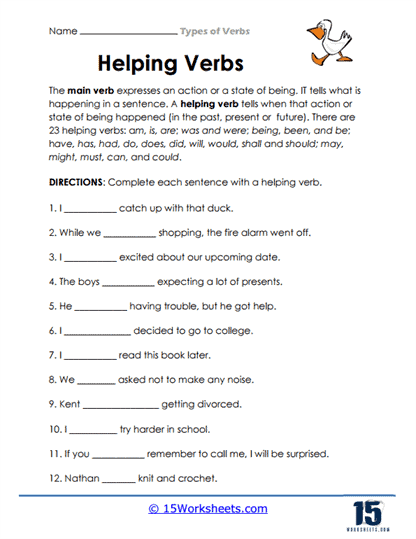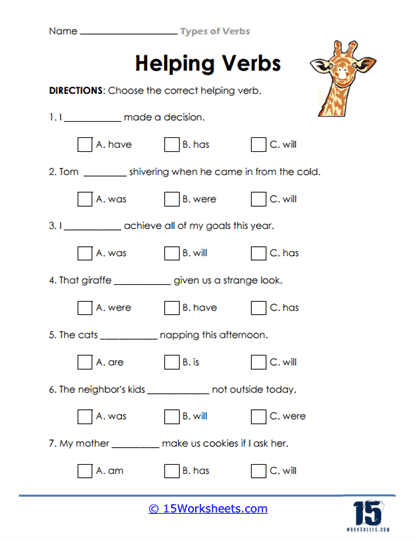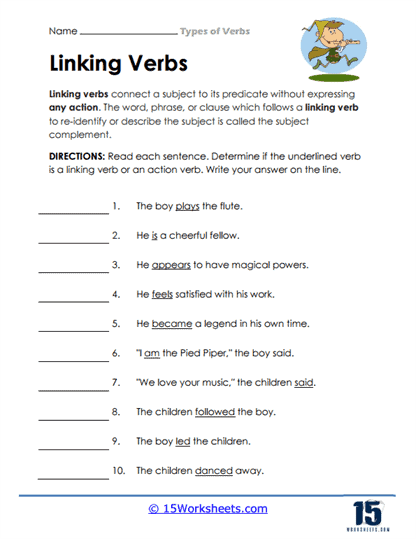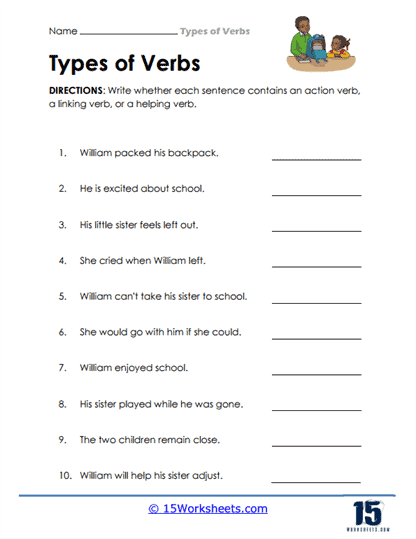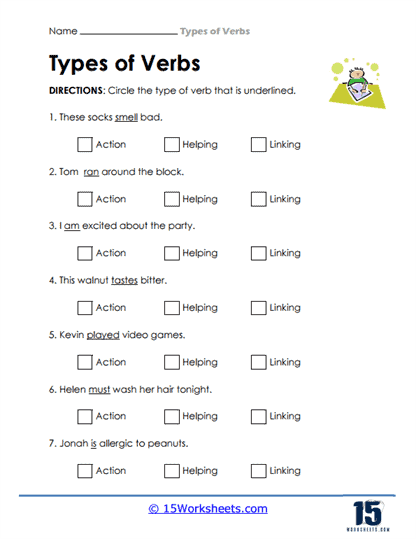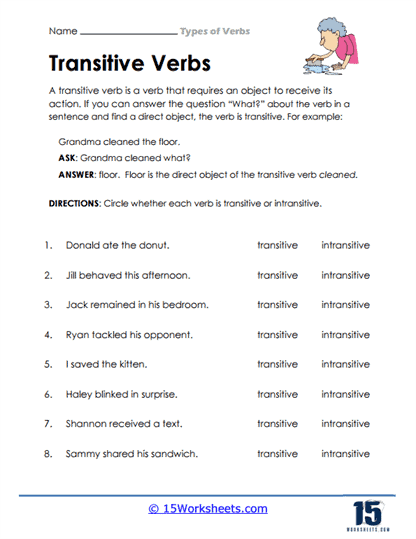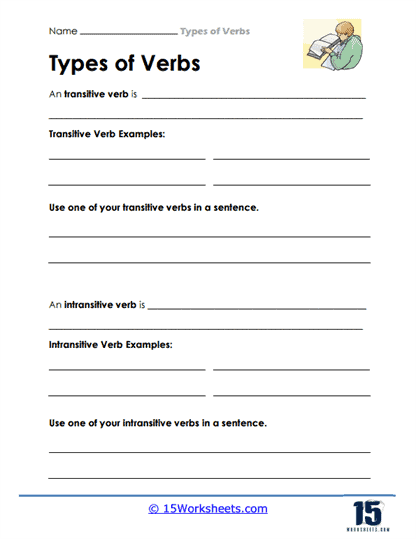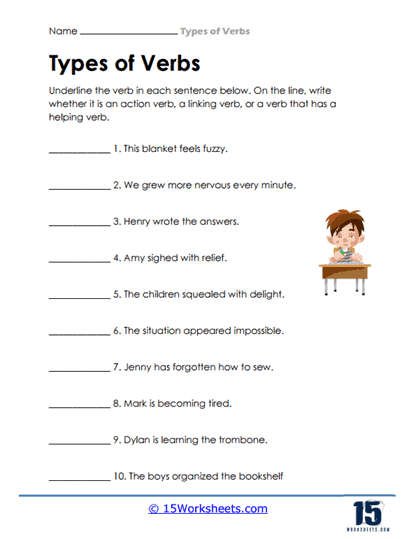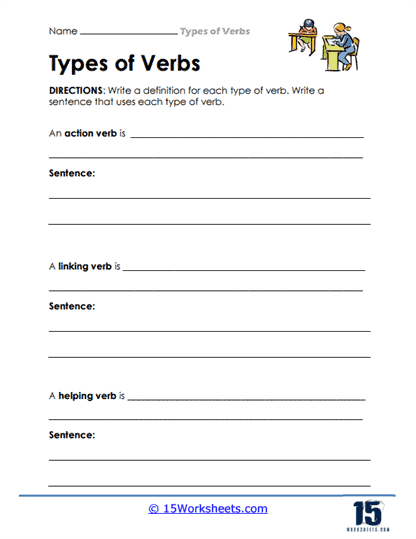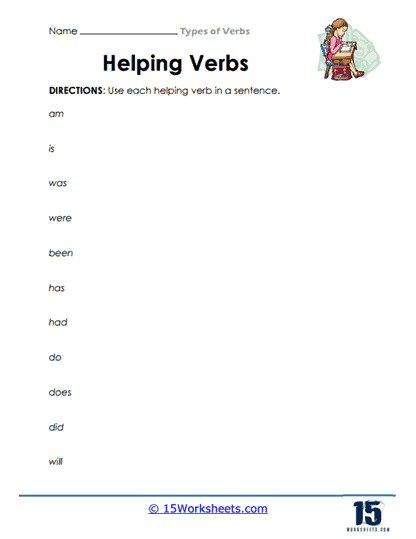Types of Verbs Worksheets
About These 15 Worksheets
These worksheets are used to enhance student understanding and mastery of different verb forms and their usage in the English language. These worksheets are integral to grammar education, providing structured practice in identifying, using, and differentiating various verb types. This comprehensive exploration of verb worksheets will cover their significance, the variety of exercises they include, and the benefits they offer to students in honing their writing and grammar skills.
Types of verbs worksheets are more than just routine grammar exercises; they are essential tools for developing a robust understanding of English grammar. Through various engaging and challenging activities, these worksheets offer a structured approach to mastering verb forms and their applications. The benefits of consistent practice with these worksheets extend beyond mere grammatical correctness; they foster a deeper appreciation and proficiency in the English language, which is invaluable for academic success and effective communication.
Understanding Types of Verbs
Before delving into the specifics of the worksheets, it’s essential to understand the various types of verbs these worksheets cover:
Action Verbs – Denote physical or mental actions (e.g., run, think).
Linking Verbs – Connect the subject to a subject complement (e.g., seem, become).
Helping Verbs – Assist the main verb in a sentence to form a verb phrase (e.g., have, will).
Transitive Verbs – Require a direct object to complete their meaning (e.g., throw, write).
Intransitive Verbs – Do not require a direct object (e.g., sleep, arrive).
Regular Verbs – Follow a standard pattern in their past tense and past participle forms (e.g., walk, walked).
Irregular Verbs – Have unique past tense and past participle forms (e.g., go, went).
Modal Verbs – Express necessity, possibility, permission, or obligation (e.g., can, must).
Types of Exercises
Identification Exercises – Students identify different types of verbs in given sentences. This helps in recognizing verb forms and understanding their functions.
Matching Exercises – Often involve matching verbs to their definitions, pictures, or sentences. This reinforces the understanding of verb meanings and uses.
Fill-in-the-Blanks – Students complete sentences with appropriate verb forms, enhancing their ability to use verbs contextually.
Sentence Creation – Encourages students to write their sentences using specified verb types, fostering creativity and application of grammatical knowledge.
Verb Conjugation – Exercises focusing on changing the verb form to match the subject, tense, or aspect, crucial for mastering verb tenses.
Transformation Exercises – Require students to change sentences from one verb form to another (e.g., from active to passive voice), promoting versatility in verb usage.
Error Correction – Students identify and correct verb-related errors in sentences, improving their proofreading and editing skills.
Multiple Choice Questions – Test understanding of verbs through carefully designed choices, enhancing decision-making and critical thinking skills.
Benefits of These Worksheets
Enhanced Understanding of Grammar – Regular practice with these worksheets deepens students’ grammatical knowledge, particularly regarding verb usage, a cornerstone of English grammar.
Improved Writing Skills – Familiarity with various verb forms and their correct usage leads to more precise and varied writing, essential for academic and creative writing.
Better Reading Comprehension – Understanding the role of different verbs aids in comprehending complex texts, as verbs are key to sentence structure and meaning.
Increased Vocabulary – Working with diverse verb types naturally expands a student’s lexical repertoire.
Error Detection and Correction – Regular practice enables students to spot and correct verb-related errors in their writing, enhancing the overall quality of their work.
Preparation for Advanced Studies – Mastery of verb forms is foundational for tackling advanced grammar and literature courses.
Confidence in Language Use – Proficiency in verb usage boosts confidence in both written and oral communication.
Standardized Test Preparation – Many standardized tests assess grammatical knowledge, including verb usage, making these worksheets valuable for test preparation.





